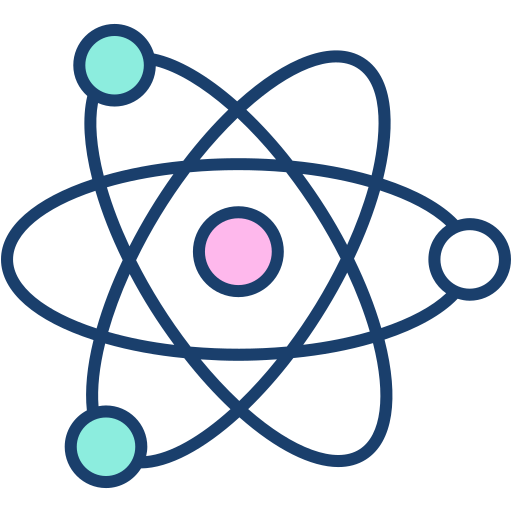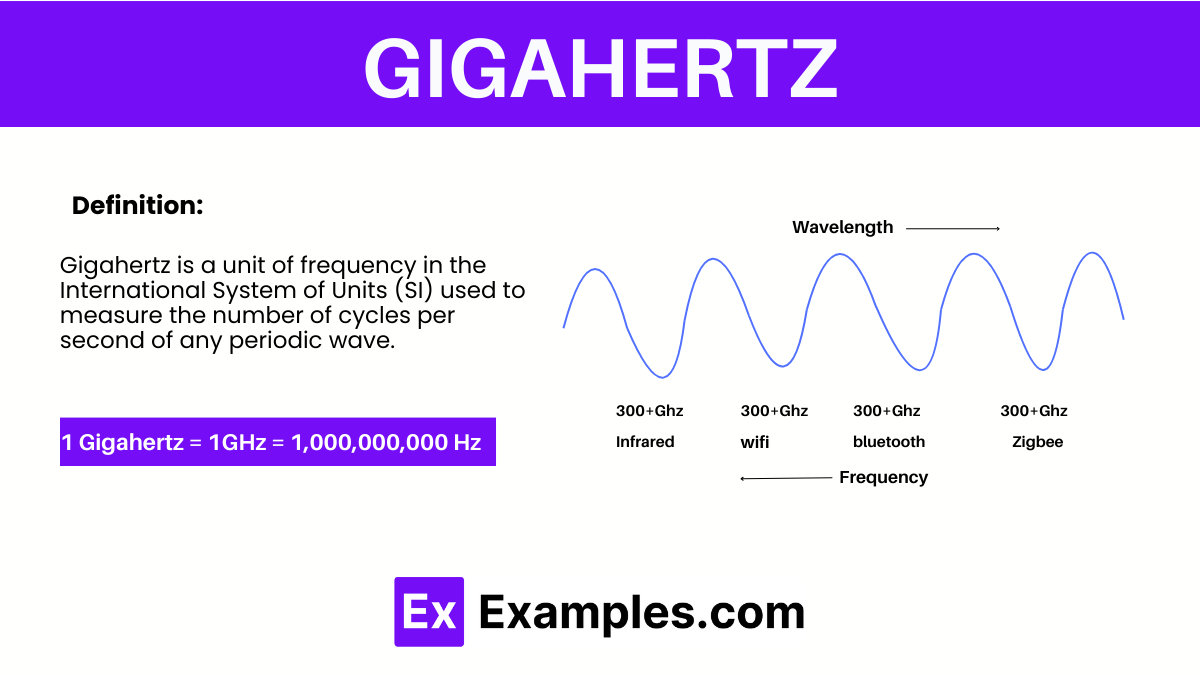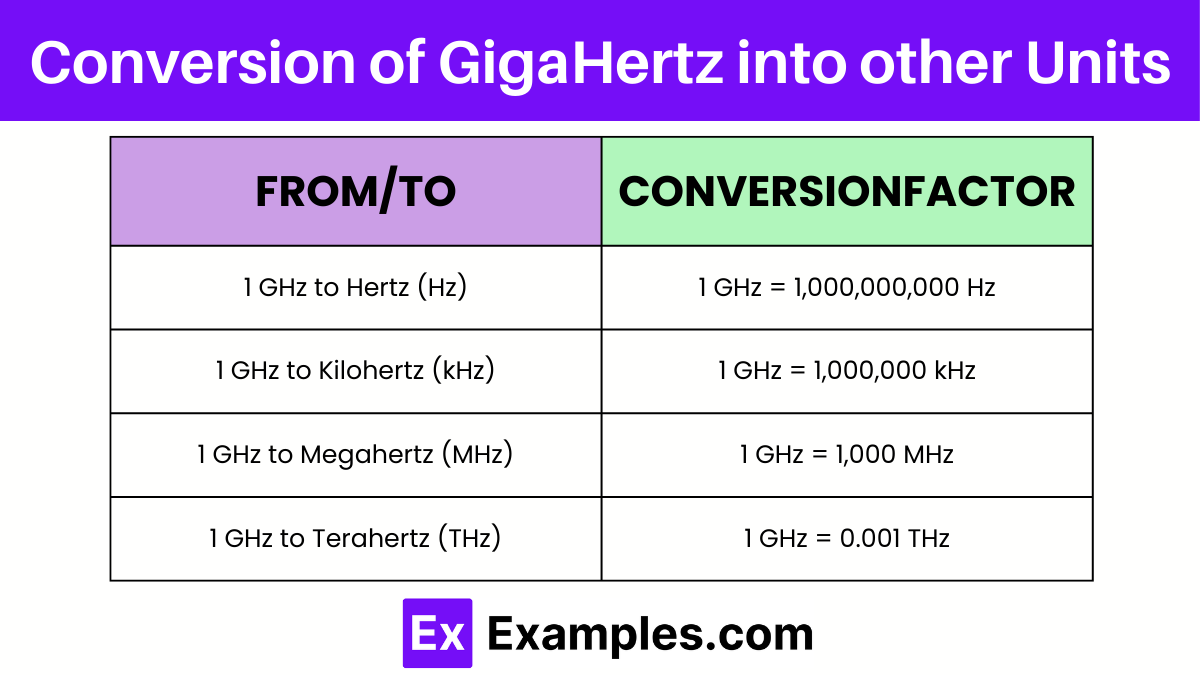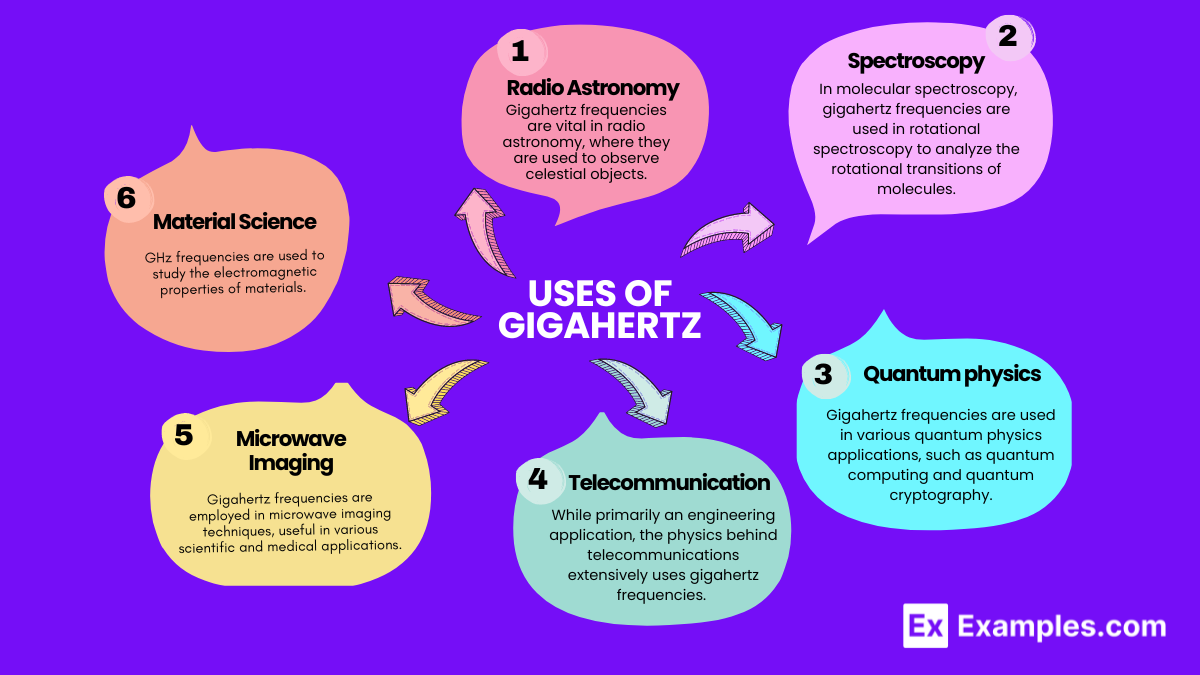What does the unit gigahertz (GHz) measure?
Voltage
Frequency
Power
Resistance


Gigahertz is a unit of frequency in the International System of Units (SI) used to measure the number of cycles per second of any periodic wave. One gigahertz is equal to 1,000,000,000 hertz (Hz), where one hertz represents one cycle per second.

| Conversion | Conversion Factor | Example Conversion |
|---|---|---|
| 1 GHz to Hertz (Hz) | Multiply by 1,000,000,000 | 1 GHz = 1,000,000,000 Hz |
| 1 GHz to Kilohertz (kHz) | Multiply by 1,000,000 | 1 GHz = 1,000,000 kHz |
| 1 GHz to Megahertz (MHz) | Multiply by 1,000 | 1 GHz = 1,000 MHz |
| 1 GHz to Terahertz (THz) | Divide by 1,000 | 1 GHz = 0.001 THz |
Explanation: Hertz (Hz) represents the unit of frequency in the International System of Units (SI). It measures the number of cycles, oscillations, or vibrations per second in a wave or periodic phenomenon. This unit is extremely useful in measuring high-frequency phenomena such as the clock speeds of modern computer processors, the frequencies used in wireless communication devices like smartphones, and in radar technology.
Explanation: A Kilohertz represents a thousand cycles per second. When dealing with frequencies as high as gigahertz, converting to kilohertz can simplify numbers for applications in lower frequency fields like audio frequencies used in telecommunication.
Explanation: A Megahertz equals one million cycles per second. This unit is vital in contexts such as broadcasting, telecommunications, and the clock frequencies of electronic computing devices, where gigahertz might be converted into megahertz for easier comparison and analysis.
Explanation: A Terahertz represents one trillion cycles per second. While gigahertz is common in current technologies, terahertz is emerging in fields like imaging technology, ultrafast computing, and spectroscopy, providing a perspective on how much more powerful or sensitive equipment is compared to traditional GHz technology.
Megahertz (MHz) and Gigahertz (GHz) are both units of frequency used to measure the number of cycles per second of an electronic signal. Here’s a look at the key differences between these two units:
| Attribute | Megahertz (MHz) | Gigahertz (GHz) |
|---|---|---|
| Scale | 1 MHz = 1,000,000 cycles per second | 1 GHz = 1,000,000,000 cycles per second |
| Relation | 1 GHz = 1,000 MHz | 1 MHz = 0.001 GHz |
| Common Applications | Radio frequencies, older computer processors, basic telecommunications | Modern computer processors, high-speed data, advanced telecommunications |
| Technological Use | Slower processing, lower communication frequencies | Faster processing, higher communication frequencies |
| Performance | Less capable of handling high-speed operations | Better suited for high-performance computing and fast communications |

Gigahertz (GHz) is a unit of frequency commonly used in physics to measure electromagnetic wave frequencies, among other applications. Here are some specific uses of gigahertz in the field of physics:
1.Radio Astronomy: Gigahertz frequencies are vital in radio astronomy, where they are used to observe celestial objects. Higher frequencies, such as those in the gigahertz range, allow for the detection of fine details in the cosmic microwave background and the study of phenomena like pulsars and quasars.
2.Spectroscopy: In molecular spectroscopy, gigahertz frequencies are used in rotational spectroscopy to analyze the rotational transitions of molecules. This can reveal details about molecular structure, bonding, and isotopic compositions.
3.Quantum Physics: Gigahertz frequencies are used in various quantum physics applications, such as quantum computing and quantum cryptography. In quantum computing, GHz frequencies can drive transitions between quantum states, crucial for operations on qubits in some types of quantum computers.
4.Telecommunications: While primarily an engineering application, the physics behind telecommunications extensively uses gigahertz frequencies. These frequencies are key in cellular networks, satellite communication, and Wi-Fi technologies, enabling high-speed data transmission over airwaves.
5.Microwave Imaging: Gigahertz frequencies are employed in microwave imaging techniques, useful in various scientific and medical applications. This includes imaging in biomedical contexts, where it can be used for non-invasive diagnostics and monitoring.
6.Material Science: GHz frequencies are used to study the electromagnetic properties of materials. This can help in understanding the dielectric properties of materials, which is essential in developing materials for specific electromagnetic applications, like radomes and stealth technology.
Overall, gigahertz frequencies play a crucial role in various branches of physics, enabling advancements in research and practical applications through their ability to probe and manipulate high-frequency electromagnetic phenomena.
1 GHz stands for 1 gigahertz, which is equal to 1 billion hertz. It represents the frequency of a signal or the number of cycles per second in a waveform.
Hertz (Hz) represents one cycle per second and is used for lower frequencies like sound waves or AC power systems. Gigahertz (GHz), equal to one billion hertz, measures higher frequencies used in telecommunications and computer processors. The key difference lies in the scale, with GHz being used for much faster and more advanced technological applications than Hz.
Yes, higher GHz typically means faster processing in electronic devices, as it indicates more cycles per second a processor can execute. This leads to quicker execution of tasks and improved performance in applications like gaming and multitasking. However, factors such as CPU architecture and core count also play crucial roles in overall performance.
Text prompt
Add Tone
10 Examples of Public speaking
20 Examples of Gas lighting
What does the unit gigahertz (GHz) measure?
Voltage
Frequency
Power
Resistance
How many hertz are in 1 gigahertz?
1,000
1,000,000
1,000,000,000
1,000,000,000,000
Which of the following devices commonly operates in the gigahertz range?
Light bulb
Television
Microwave oven
Battery
If a processor has a clock speed of 3.5 GHz, how many cycles does it complete per second?
3.5 million
3.5 billion
35 million
35 billion
Which technology utilizes frequencies in the gigahertz range for communication?
AM Radio
FM Radio
Wi-Fi
Electrical Wiring
Convert 5 GHz to megahertz (MHz).
500 MHz
5,000 MHz
50,000 MHz
500,000 MHz
What is the wavelength of a signal operating at 1 GHz in a vacuum? (Speed of light c = 3×10⁸ m/s)
0.3 meters
3 meters
30 meters
300 meters
Which band of the electromagnetic spectrum includes frequencies in the gigahertz range?
Radio waves
Microwaves
Infrared
Ultraviolet
A radar system operates at a frequency of 10 GHz. What is its period?
0.1 ns
0.01 ns
0.1 ms
0.01 ms
Which of the following has the highest frequency?
2.4 MHz
24 GHz
2.4 kHz
24 MHz
Before you leave, take our quick quiz to enhance your learning!

